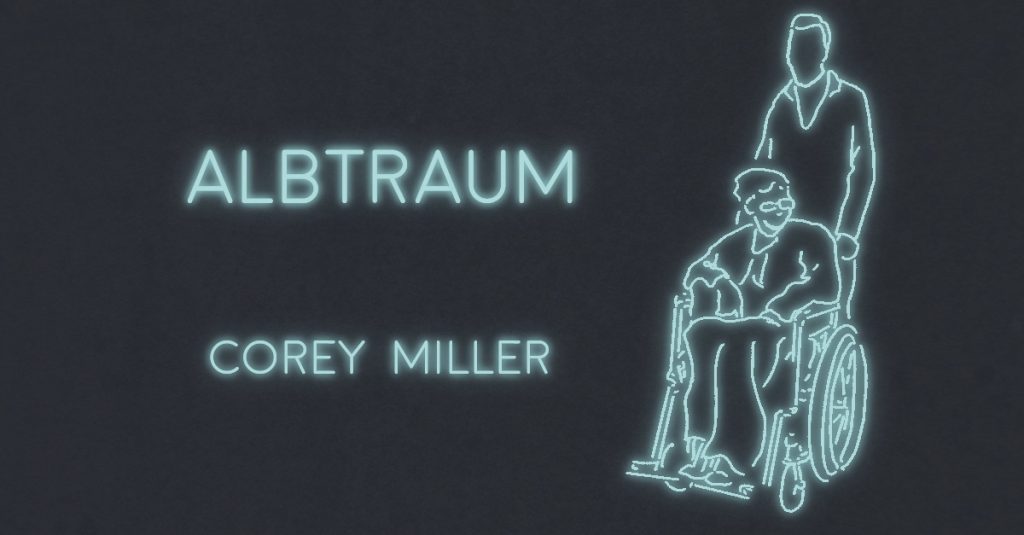I coax Mother’s wheelchair through Newark terminal to our United gate. I pray she knows where she is—where she is going.
I can’t understand her anymore; sensing death she no longer speaks in English. She dreams of her hometown, Essen, Germany. Unaccustomed mother tongue, I download Duolingo on my iPhone to learn Deutsche. To decipher her code.
Returning Mother to her homeland, I use all of my sick days from work, expecting to catch a bug at some point throughout the year. I’ve never traveled outside of America. My passport on the verge of expiring.
Mother’s lips are as tight as a treasure chest when it’s time for her medicine. The airport terminal eyes us foreign. Vacationers ready for a good time, not to witness the end of the line. I force her to consume healing capsules. The army of tablets are protection, so she won’t panic in public, believing she teleported there.
Duolingo is good at teaching single words and building up to sentences.
Good day. Guten Tag. Goodbye. Auf Wiedersehen.
I am a man. Ich bin ein Mann.
I am a strong man. Ich bin ein stark Mann.
Meine Mutter hasn’t been back to Deutschland since she was twenty, arriving in America with unborn me. She recalls stories of riding her Westphalian horse through the town center as a Mädchen. She raised me by herself in America. She would always talk about how much of the world she experienced growing up, how much of the world I missed by tending her needs.
On the plane, meine Mutter doesn’t speak—she screams. Her body is a guitar string, wound tight and vibrating. The other passengers all look the same to me as I pan between them, restraining my final family member. The crew is bilingual. They say Mother cries of foals and mares. They watch me force the pills down her throat like I want her to throw up. An inflight map depicts a plane surrounded by water.
Growing up, Mother would tell me I was gifted when the other boys called me names at baseball practice. She would tell me I was strong and I’d accomplish greatness. What if that’s a mantra mothers are required to preach? A page from The Mother’s Playbook. I didn’t have time for friends when my mother required all of my love. Now I cook softer foods, my opinion of makeup turned into application, I accompany her up and down each step.
My mind is a freezer thawing. Memories sitting in ice trays, warming back into water and evaporating. Did meine Mutter dye these thoughts different colors? Grün, blau, und rot cubes containing the times we cantered the horses bareback through open fields of clover. Bits of purple memories kicked into my backside, the shape of a horseshoe.
We fly into Dusseldorf because the airport in Essen is classified as a minor unscheduled facility. “Essen” in Deutsche means “to eat.” A town made of food, I think. A whole gingerbread village where everyone can be a cookie-cutter friend. The little I know isn’t enough to save me here.
Pushing her wheelchair across cobblestones through the treeless Altstadt to the train station is like pushing against a wall. The resistance ist stark. Ich bin stark.
In Deutschland, you count starting with your thumb as if everything is A-OK. Four is spelled “vier” but is pronounced “fear.” Ich bin ein stark Mann.
Mutter peers at statues, mouth agape. I learn of a German word that doesn’t translate into English well: Gemütlichkeit. It’s a feeling of warmth usually associated with having close friends present.
The city smells like it’s been here since the start of time. Aromatic honey and barley overflow from the shops and the peddlers manage raw food with their bare hands. “Hell” means “bright.” The sun is hell, berating my doubt and casting shadows of those who stand tall.
I hesitate translating the train system. Lists and screens and platforms — I don’t want to go the wrong way.
The stories she told me always ended with how her Westphalian died of colic. Pferde can’t vomit because their esophagus contains muscles shoving in one direction, the inability to vomit can tangle their insides.
We board the train with assistance from the conductor; he lowers a bridge to mind the gap and wheel aboard. The towns come and go, divided by farmland large enough to home a cow for each resident. Shelter is necessary for livestock, but I wonder if, like humans, there’s such thing as too much. I ask Mother if she knows where she is. “Wo sind wir?” She smiles as she collapses out of her wheelchair, crumbling onto the floor. The doors slide open, the conductor announces Essen, next stop Bochum. I see banners hung in the station that I cannot read, yet, it feels like the vertebrae in my spine have realigned. Pictures of horses jumping obstacles and pulling plows for Equitana, one of the largest horse festivals. Meine Mutter smiles, not looking outside. She locks eyes with me and I can see the years she’s bartered for this final moment of clarity — for the pair of us.

